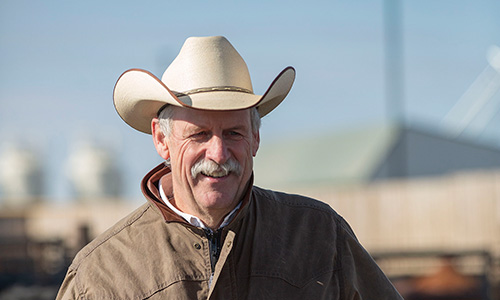The College of Agriculture and Bioresources presents Advancements in Agricultural Research, a seminar series featuring individuals conducting agricultural research across the University of Saskatchewan.
Join us online to learn about the innovative ways our researchers are tackling today's environmental and biotechnological challenges in order to feed a growing and hungry world!
The seminars are free and open to everyone.
Upcoming Seminars
The United Nations has designated 2026 as the International Year of Rangelands and Pastoralists to promote an understanding and appreciation of rangelands around the world and the people who use them. This round of seminars will highlight some of the rangeland and pastoralist related research at USask.
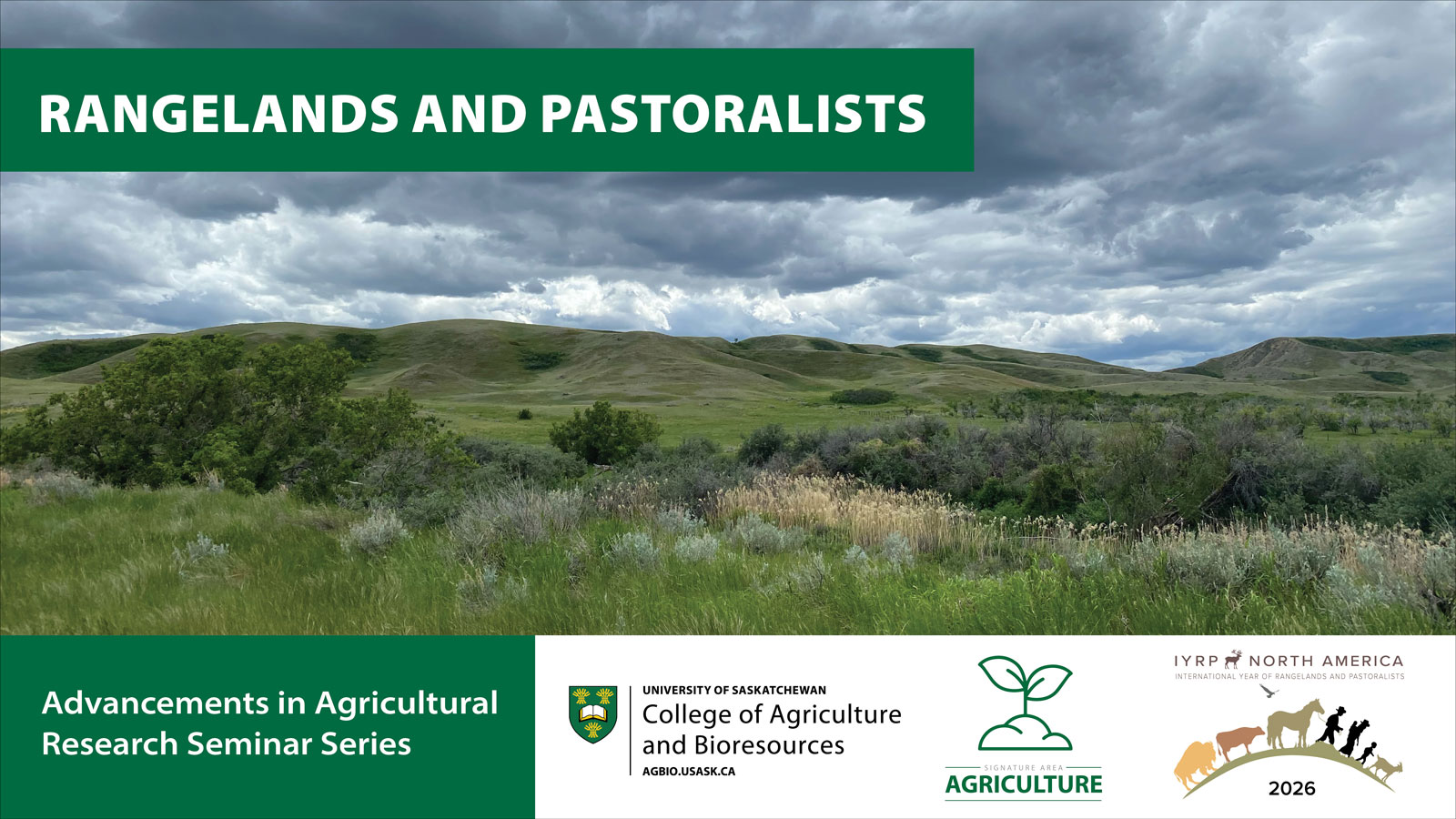
Seminars are held online via Zoom, 3 - 4 pm.

Dr. Christy Morrissey (PhD), Professor, Department of Biology
Marginal cropland is often defined as low yielding unprofitable areas in fields that can be targeted for restoration to perennial grasses. Our team is working with farmers across the prairies to map marginal land using predictive yield models, then plant these areas with tame and native forages in order to study the sustainability benefits over time.

Dr. Xulin Guo (PhD), Professor and Head, Department of Geography and Planning
Sustainable grasslands are characterized by low woody plant cover. With growing consumer interest in sustainably produced goods, satellite remote sensing can provide an accurate and timely depiction of grassland sustainability with respect to woody plant encroachment.
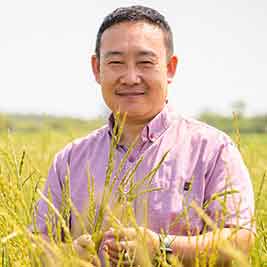
Dr. Bill Biligetu (PhD), Associate Professor and Ministry of Agriculture Strategic Research Program (SRP) Chair in Forage Crop Breeding, Department of Plant Sciences
This talk provides an overview of 100 years of perennial forage breeding in Western Canada and its significance for livestock and forage systems. It will also discuss key challenges and outline emerging opportunities for innovation in the era of advanced technologies.
Past Seminars
Winter 2026
Rangelands and Pastoralists

Dr. Eric Lamb (PhD), Professor, Department of Plant Sciences
The use of prescribed fire has seen a resurgence in Saskatchewan. This talk explores the use of planned or prescribed fire to manage grassland health including promoting biodiversity and improving productivity.
February 24, 2026

Dr. Jon Bennett (PhD), Associate Professor, Department of Plant Sciences
Plant interactions with soils and soil microbes are critical drivers of plant growth, including for invasive species. I will discuss how soils and soil microbes influence the success of different invasive plants across the prairies, and how this relates to their management.
February 3, 2026
Fall 2025
SustainaBILLity: The economics of sustainable agriculture

Kathy Larson, Professional research associate and Ministry of Agriculture Strategic Research Program agricultural economist, Department of Agricultural and Resource Economics
This talk touches on the economic sustainability of cow-calf operations and share results from the financial analysis of practices with soil health or sustainability claims.
October 21, 2025

Dr. Tristan Skolrud (PhD), Associate professor, Department of Agricultural and Resource Economics
This talk discusses recent research on the economics of regenerative agriculture in Saskatchewan, including case studies with regenerative producers and findings from a survey on integrated crop-livestock practices.
October 14, 2025
Dr. Eric Micheels (PhD), Associate Professor, Department of Agricultural and Resource Economics
This talk explores how production and financial records can be used to track key performance indicators in cow–calf operations, and the role these metrics play in improving economic efficiency and long-term sustainability.
October 7, 2025

Dr. Jill Hobbs (PhD), distinguished professor, Department of Agricultural and Resource Economics
This talk explores consumer responses to sustainability labelling and certification in food markets, and the implications for agri-food supply chains.
This seminar was presented in collaboration with Global Biotech Week.
September 23, 2025
Spring 2025
Pathways to sustainability: Agricultural Research in a changing climate

Dr. Chantel Chizen (PhD), Assistant Professor, Digital Pedology and Pedometrics
Sustainable land management for agricultural resilience in Saskatchewan
There is an ongoing need to increase productivity and efficiency in Saskatchewan’s agricultural systems, despite challenges such as soil salinity, extreme weather events, and soil variability. This presentation will explore land management strategies to address these issues with a focus on wetlands and marginal soils. Additionally, I will highlight the role of soil data management and ownership in supporting informed land-use decision-making that can enhance agricultural resilience.
April 15, 2025
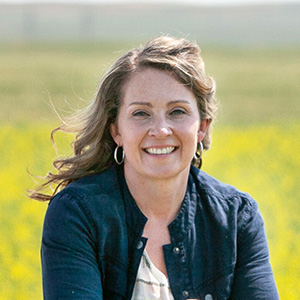
Dr. Bobbi Helgason (PhD), Associate Professor, Soil Microbiology
Soil microorganisms: Working with the invisible warriors that bolster agroecosystem resilience
Soil microorganisms transform plant tissues into soil organic matter, cycle nutrients, and aid in regulating plant health and growth. Through these actions, they are important regulators of agroecosystem resilience, but they are also agents of disruption when they act as pathogens or drive inefficient nutrient transformations that threaten ecosystem health. We will discuss how “thinking like a microbe” provides an opportunity to contemplate agroecosystem management through a lens that aims to optimize microbial contributions to efficient nutrient use, plant health and soil health in the face of intensification and a changing climate.
April 8, 2025

Dr. Sean Prager (PhD), Associate Professor, Entomology
Comprehensive approaches and ecological considerations foriInsect, pest and vector management
Insects, plants, and microbes engage in some of the most important and complex interactions in all of biology. Insects are the most diverse group of animals and have a long evolutionary history with plants, which they use as food sources, reproductive substrates, and shelter. In addition, both plants and insects have relationships with microbes that can be important to their biology and ecology in ways that we are just beginning to appreciate. Many sustainable pest management employ knowledge of these relationships and of insect ecology. We will discuss these relationships in the context of comprehensive pest management approaches.
April 1, 2025

Dr. Kate Congreves (PhD), Associate Professor and Jarislowsky and BMO Research Chair in Regenerative Agriculture
Nitrogen, agriculture, and the environment
Nitrogen is simultaneously an essential resource for agricultural production and an environmental threat. On one hand, nitrogen fertilizer is crucial for supporting crop production; but on the other, fertilizer application to soil results in emissions of nitrous oxide, a potent greenhouse gas representing a third of Canada’s agricultural greenhouse gas emissions. Lowering emissions through improved fertilizer use is important for reducing the overall supply-chain carbon footprints, and meeting fertilizer-related emission targets set by the government. However, this pathway to sustainability depends on a better understanding of nitrogen dynamics under practices designed to reduce emissions. Here, I will share our recent research findings based on nitrous oxide measurements using micrometeorological techniques for prairie cropping systems, as well as our work on crop nitrogen use efficiency. I will also explore the upcoming opportunities and challenges for nitrogen management, such as green ammonia technology and shifting towards regenerative agriculture philosophies. These contributions are feeding intolarger initiatives working towards sustainable nitrogen management, including the new Canadian N2O Network and the Global N Center.
March 25, 2025

Dr. Flavia van Cleef (PhD), Assistant Professor and Beef Industry Integrated Forage Management and Utilization Chair
Sustainable livestock production systems in Saskatchewan: Challenges and opportunities
Saskatchewan's livestock industry plays a crucial role in global food security, but it also faces increasing pressure to adopt more sustainable practices. We will explore key strategies for improving the sustainability of livestock production systems, with a focus on forage-based systems and the role of alternative feed resources on greenhouse gases mitigation. We will discuss how innovative management practices can enhance productivity while minimizing environmental impacts, ensuring the long-term viability of the industry in the face of climate change and evolving market demands.
March 18, 2025

Dr. Bryan Mood (PhD), Lecturer and Renewable Resource Management Program Coordinator
Leveraging climate data to support better research outcomes
Climate data are critical for better research as we look forward to a more sustainable tomorrow. Big data, better computers, and long-term repositories have led to its proliferation but what does any of it mean? How do you use it appropriately? What is an SSP? In this presentation, I will provide an overview of the state of Canadian climate science, future scenarios, and how we can use it to understand potential risks and concerns both now and into the future. Case studies will be provided to contextualize how climate data can be leveraged effectively to support research needs.
March 11, 2025
Fall 2024
Cultivating knowledge: Agriculture across the disciplines
Presenter:
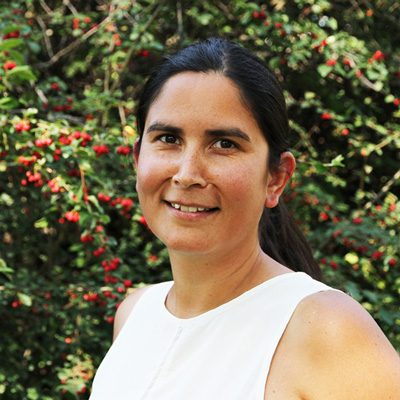 |
Soil Science |
 |
kihci-okâwîmâw askiy Knowledge Centre |
October 22, 2024
Presenters:
 |
Food and Bioproduct Sciences |
 |
Food and Bioproduct Sciences |
October 8, 2024
Presenters:
 |
Agricultural and Resource Economics |
 |
Nutrition and Dietetics |
 |
Ag-West Bio |
October 2, 2024
Presented in partnership with Global Biotech Week
Presenters:
 |
Animal and Poultry Science |
 |
Dr. Ketema Daba Abdi Crop Development Centre |
September 24, 2024
Presenters:
 |
Canadian Centre for Rural and Agricultural Health |
 |
Chemical and Biological Engineering |
 |
School of Rehabilitation Science |
September 18, 2024
Winter 2024
Digital Agriculture

Dr. Preston Sorenson, Research Associate, Soil Science
February 13, 2024
The development of big data remote sensing platforms and machine learning tools has led to an exponential increase in soil information. Research in this area at USask has been focused on developing these tools for applications ranging from precision soil management to improved carbon stock forecasting. This presentation will focus on discussing how digital agriculture can improve soil management in Saskatchewan.

Dr. Derek Peak, Professor, Soil Science
February 7, 2024
Spectroscopy allows soil chemists to directly measure the form of nutrients and soil constituents directly. Spectroscopic tools both in the laboratory and at the synchrotron can provide novel information that can then be used to improve soil tests, remediation approaches, and agronomic practices.

Dr. Ian Stavness, Associate Professor, Computer Science
January 31, 2024
Digital data has improved the effectiveness of agricultural R&D and the efficiency of farm operations in Saskatchewan and across Canada. Computational agriculture goes a step further than “digital agriculture” to perform large-scale computations with large agricultural datasets to generate predictions, forecasts and data-driven decisions. The next generation of computational agriculture tools and apps have potential to dramatically increase farm profitability, resiliency and sustainability over the next decade. Saskatchewan is well-positioned to lead-the-charge in this growing area, but requires two important inputs: talented people and large datasets. In this talk, I will introduce the new NSERC CREATE Training Program in Computational Agriculture at the University of Saskatchewan, which aims to tackle the first challenge of creating a talent pipeline of trail-blazing individuals who can push the boundaries at the interface of computer science and plant science. I will also argue for the need for a Saskatchewan Agricultural Data Strategy to harvest, protect and share the valuable and growing data resources generated by Saskatchewan farms, companies and research institutions for the benefit of the entire Saskatchewan Agriculture sector.

Dr. Steve Shirtliffe, Professor, Department of Plant Sciences
January 24, 2024
Crop imagery from drones and satellites can now provide plant breeders and agronomists useful information to assist in crop breeding and management. This presentation will review some of the recent research at the Crop Imaging Lab at the University of Saskatchewan. We are now at a crossroads where remotely sensed satellite information can be analyzed with machine learning to inform agronomic decisions. Cheap drones can be used to scout canola fields for crop emergence and allow farmers to make informed reseeding decisions. UAV trained machine learning models can now use satellite data to map kochia infestations on farmer’s fields and target control measures. These models can also use satellite and environment data to make accurate yield predictions before harvest. Crop classification maps can be used to determine the risk of root rot based on crop rotations for any field in western Canada. And finally, our lab is in the process of wall-to-wall mapping of all western Canada at a 10m resolution to measure and understand the causes of within field spatial variability in crop yield and profitability.

Fall 2023
Food, Bioproducts and Biotech
Dr. Peter Slade, Canadian Canola Growers Agricultural Policy Chair
November 1, 2023
Business risk management (BRM) programs are the primary policy tool used by government to support farmers in Canada. Subsidized BRM programs increase profits and reduce farm risk. They also change the incentives for farmers to engage in other management practices, such as optimizing input use, hedging price risk, and diversifying crop rotations. This presentation will overview research that examines the effect of BRM programs on farm-level decision-making and farm outcomes in Saskatchewan.

Dr. Stuart Smyth, Agri-Food Innovation and Sustainability Enhancement Chair
October 25, 2023
Innovation plays a fundamental role in the advancement of all sectors of the economy and agriculture is no exception. Genomic innovations from genetically modified crops and increased chemical and fertilizer use efficiencies from equipment are two leading drivers of increasingly sustainable crop and food production. Innovations over the past 30 years have resulted in the removal of over 95% of summerfallow acres in the province. This presentation will draw on farm level data to quantify the sustainability advances in Saskatchewan agriculture.

Each year approximately 40 per cent of grains and oilseeds produced in Canada are used in animal feeds providing a very important market for Canadian farmers and food processors. The feed industry is uniquely designed to convert low quality grains and byproducts and use them to create high quality meat milk and eggs. Research Dr. Newkirk conducts using the Canadian Feed Research Centre in North Battleford is focused on increasing the efficiency of this conversion by improving processing methods and creating new product applications for these important crops and their by-products. This seminar will focus on the opportunities for value added processing, the unique ability of the Canadian Feed Research Centre to conduct this research and will discuss opportunities for this research in the future.
Dr. Martin Reaney, Ministry of Agriculture Strategic Research Program Chair in Lipid Quality and Utilization
October 11, 2023

Dr. Yongfeng Ai, Ministry of Agriculture Endowed Research Chair in Carbohydrate Quality and Utilization
October 4, 2023
Carbohydrates are a major component of many crops cultivated in Saskatchewan, particularly pulses and cereals. This seminar will focus on the utilization of milling, extrusion, infrared heating, germination, and air classification as effective processing technologies to enhance the functional and nutritional attributes of carbohydrates in food/feed ingredients and final products. The progress in a multi-disciplinary project of transforming pulse starches into food ingredients, fermentative protein, synbiotic composition, biomaterials, and biomedicals materials will also be presented and highlighted. The new understanding of the structure-function-nutrition relationships of carbohydrates acquired from processing will be meaningful for the agri-food sector in Saskatchewan and Canada to convert various crops into high-value products.

Dr. Mike Nickerson, Ministry of Agriculture Strategic Research Program Chair in Protein Quality and Utilization
September 26, 2023
Canada has uniquely position itself as an emerging leader in the global plant-based proteins ingredient space because of its rich supply of raw materials, and significant investments in value-added ingredient manufacturing, research, the plant-based food economy, and young talent. In doing so, a shift from selling crops at bulk commodity prices to producing higher valued ingredients is occurring across the Prairie Provinces, creating significant economic growth including the formation of new jobs. To support growth, significant research efforts aimed at developing sustainable, economically viable, industry adoptable, and commercially ready technologies for utilization of proteins, protein-rich co-products and ingredients in food, feed and bioproducts is under way. This webinar will discuss advances in plant protein research occurring within Saskatchewan (and across Canada), considering crop quality attributes, novel fractionation strategies, advancing ingredient performance further through clean label processes (e.g., enzymes, fermentation, etc.), and the development of plant-based food innovations.
Spring 2023
Plants and Soils

Dr. Bunyamin Tar'an, Ministry of Agriculture Strategic Research Program Chair in Chickpea and Flax Breeding and Genetics
The chickpea and flax breeding programs at the CDC focus on the development of superior chickpea and flax cultivars for western Canadian environments. In Saskatchewan chickpea is best adapted to the brown and dark brown soil zones. The growth of chickpea production in western Canada depends on the development of new cultivars with high yield, early maturity, and improved resistance to ascochyta blight disease, which will enable the crop to be grown over a larger area with reduced production risk. Breeding efforts are directed to develop high yielding chickpea cultivars with early maturity, improved disease resistances and acceptable seed quality characteristics. The flax breeding program focuses onmaking the crop more competitive, widely adapted, while maintaining its high quality. The breeding goals include higher seed yield with improved resistance to diseases (such as pasmo, fusarium wilt, rust and powdery mildew), early maturity, improved straw management, visual seed appearance and seed nutritional quality. Climate change has posed a new challenge to chickpea and flax production. We are currently exploring the genetic components associated with the abiotic stress tolerance in chickpeas that will allow us to develop cultivars with better adaptability to adverse environmental conditions. Efforts to widen the genetic base and enhance the knowledge of the genetics of important traits in chickpea and flax are underway. Genomic technology at different levels is being put together to help to achieve the chickpea and flax breeding objectives. In addition to chickpea and flax, Dr. Tar’an also works on the genetic improvement of coriander and caraway for resistance to blossom blight.
March 28, 2023
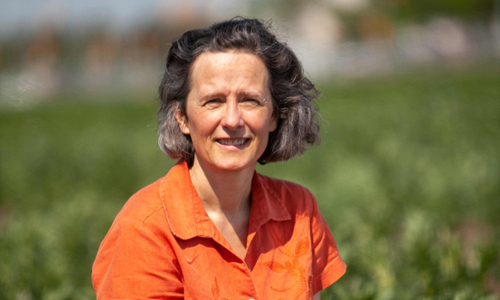
Dr. Sabine Banniza, Ministry of Agriculture Strategic Research Program Chair in Pulse Crop Pathology
The pulse crop pathology program was initiated in 1998 to support the pulse breeding programs at the CDC and develop knowledge and tools for the management of diseases in the expanding pulse industry in Saskatchewan. Much of the early research was focused on developing management tools for newly emerging diseases, such as ascochyta blight in chickpea and in collaboration with the provincial plant pathologist led to the development of a decision support system for fungicide applications. Large scale population studies were conducted on the causal organism, Ascochyta rabiei of this disease in chickpea, and the lentil pathogen Ascochyta lentis, revealing shifts in the populations to higher virulence and an erosion of resistance in widely grown cultivars. A considerable amount of research has concentrated on Colletotrichum lentis, causal agent of anthracnose of lentil, whose genome was sequenced and interaction with the host has been dissected in detail. In the last 10 years, emerging root rot pathogens, particularly Aphannomyces euteiches and Fusariumspp. have taken center stage with the objective to identify durable resistance in pea, lentil and chickpea.
March 21, 2023
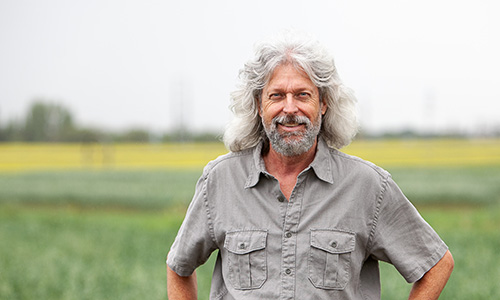
Dr. Randy Kutcher, Ministry of Agriculture Strategic Research Program Chair in Cereal and Flax Crop Pathology
Since 2011, the cereal and flax pathology program has provided tools and knowledge to Saskatchewan growers for disease mitigation or control. The program supports the pathology needs of plant breeders at the Crop Development Centre and conducts research into integrated pest management strategies. Stripe rust, Fusarium head blight, and recently bacterial leaf streak of wheat and barley; pasmo and wilt of flax; and leaf mottle and Fusarium seed infection of canaryseed have been, and continue to be important diseases for Saskatchewan growers. Our objectives are to increase our knowledge of these diseases in the province to better inform plant breeders of the characteristics and genetics of the causal pathogens and provide research findings to improve disease management strategies for growers and agronomists.
March 14, 2023
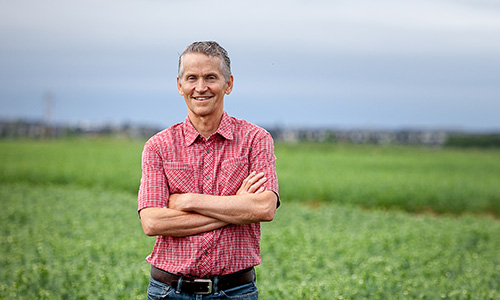
Dr. Tom Warkentin, Ministry of Agriculture Strategic Research Program Chair in Pulse Crop Breeding and Genetics
The field pea breeding program at the Crop Development Centre (CDC) aims to develop high yielding cultivars with resistance to powdery mildew, improved resistance to the ascochyta blight and root rot complexes, improved resistance to lodging, and improved end-use quality for export and domestic markets. These goals are addressed in collaboration with local, national, and international collaborators. To specifically address the breeding goals, research is conducted to identify pea germplasm with enhanced resistance to environmental stresses, particularly heat and drought, to improve the market value of field pea in terms of seed visual appearance, nutritional quality, culinary properties, flavour profile, and functional properties including milling, baking, and cooking, to develop and utilize genomic tools for key traits. The CDC pea breeding program has released some 40 cultivars over the past two decades and these cultivars have approximately 65 percent market share in the Canadian prairies. The soybean breeding program at the CDC is younger than the pea program. It aims to develop maturity group 000, high-yielding, high protein soybean cultivars for the northern frontier production regions. The first CDC soybean cultivar releases are expected in the coming year or two.
March 7, 2023

Dr. Jeff Schoenau, Ministry of Agriculture Strategic Research Program Chair in Soil Nutrient Management
This seminar highlights research work and accomplishments in the soil fertility and nutrient management research program led by Dr. Schoenau from 1980s to present. An overview of work in fertilizers, organic amendments, cropping systems, and soil quality from an agronomic and environmental perspective is provided.
February 14, 2023
Fall 2022
Beef and Forage
Achievements and challenges in breeding perennial forage crops in western Canada

Dr. Bill Biligetu, Ministry of Agriculture Strategic Research Program (SRP) Chair in Forage Crop Breeding
December 6, 2022
Technology and techniques in applied beef and forage systems
Dr. Bart Lardner, Ministry of Agriculture Strategic Research Program (SRP) Chair in Cow-Calf and Forage Systems
November 23, 2022
Gut health in beef cattle

Dr. Greg Penner, University of Saskatchewan Centennial Enhancement Chair in Ruminant Nutritional Physiology
November 21, 2022
Ergot alkaloids in feedlot diets: How much is too much?

Dr. Gabriel Ribeiro, Saskatchewan Beef Industry Chair
November 15, 2022



